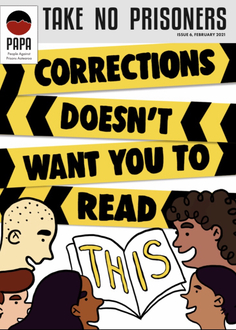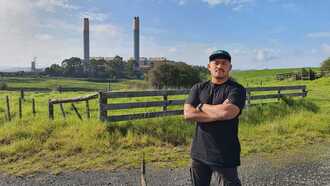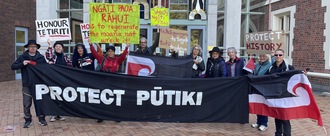-
Bring people in Afghanistan to safety in AotearoaMost people - in Afghanistan and in Aotearoa - want to do all that they can to build communities and a world where everyone can live, work and play in dignity and peace, where people can make decisions about their own lives and set goals for their future. In both countries, people care deeply about taking care of each other, and take action every day to protect the wellbeing of people in their communities. But right now, people in Afghanistan are fleeing their homes to stay alive. The people who worked hardest to build human rights, equality, and democracy for their communities are now at the greatest risk. People who built schools for girls, worked at human rights organisations, contributed to a free and independent media, took part in the creative arts - all of them are now targets. People who worked at organisations New Zealand supported, like the Afghan Independent Human Rights Commission, and people who worked at international organisations like the United Nations. Some people are at risk just because of who they are, including ethnic minorities and LGBTQI+ people. We can help these people. The New Zealand government has already decided to send an emergency evacuation mission to Afghanistan to help New Zealand citizens and Afghans who worked directly with the New Zealand government’s efforts in Afghanistan. This is absolutely the right thing to do. But it isn’t enough. Evacuation support needs to be provided to a wider group of people who are especially vulnerable to attack right now. Sign your name to show the New Zealand Government we support them using every lever available to provide support and safety to people in Afghanistan as soon as possible. We call on the New Zealand government to: ▪️Widen evacuation support from Afghanistan to more people, including those who are particularly vulnerable to attack such as: civil society workers, journalists, academics, activists, human rights defenders (including the staff of the Afghan Independent Human Rights Commission) and other vulnerable people, as well as Afghan nationals who have family in Aotearoa New Zealand. ▪️Expedite visas, deliver support for evacuations from Kabul airport and provide relocation and resettlement. ▪️Action an immediate pause on the deportation of people to Afghanistan. New Zealand has an opportunity to lead with compassion and act in solidarity with people in Afghanistan who have stood up for things that New Zealanders care deeply about: protecting the freedom, dignity and safety of everyone in our communities and making sure we all have the chance to set and pursue our own goals in life. Please note that Amnesty International Aotearoa has a very similar petition. If you have already signed that one, you can sign this one as well, and vice versa. We have coordinated with them on the wording of this petition, and when it comes time to deliver these petitions we will work with them on that as well.12,267 of 15,000 SignaturesCreated by Marianne Elliott
-
#BusFair 🚌https://vimeo.com/596169867 Public transport is crucial in the fight against climate change, making our cities more liveable and supporting sustainable mobility for vulnerable and low-income communities. However bus drivers, passengers and the environment have been victims of a decades-long experiment in privatisation. The Climate Commission has called for a doubling of public transport use nationwide, however poverty wages are making it impossible for operators to recruit new workers. Cancellations are rife, and further industrial action looms on the horizon. The bus privatisation experiment has failed. In July 2021 FIRST Union’s #BusFair campaign called for the Ministry of Transport to abolish the current tendering model (the “PTOM”), massively increase investment in public transport, and work together with stakeholders to bring our public transport back into public ownership. That’s because three decades of bus privatisation has been disastrous for drivers, passengers, and the environment, shifting wealth from workers’ wages into offshore private equity firms that control our network. The PTOM tendering model put this approach on steroids, rewarding operators with the lowest labour costs. Significant investment is needed to lift workers’ wages, increasing the reach and regularity of our bus network, progressively reducing fares and establishing more bus-only infrastructure. However private ownership is a barrier to addressing these concerns. Support for public ownership is now growing, with Greater Wellington Regional Council and the Green Party supporting, as well as bus drivers and passengers across the country. Tell the Minister of Transport that it’s time to bring #ourpublictransport back into public ownership.1,607 of 2,000 SignaturesCreated by FIRST Union .
-
Fix this State Highway 3 Intersection and save livesThis State Highway Intersection is a historical unresolved community problem for the businesses residents, road users, and emergency services of the district. There have been countless attempts by the local community to engage Waka Kotahi NZ Transport Agency to implement a safe and effective traffic management plan for this intersection. The local businesses witness and are affected by vehicle accidents and near misses at this intersection on a daily basis. Yet Waka Kotahi NZ Transport Agency have no plans to upgrade this intersection. The current configuration of this intersection is poorly planned, not fit for purpose and is the cause of life-threatening incidents to users every day. Ambulance response times to the community at large are adversely affected by the poor traffic flow through this intersection. If this intersection is not rectified in the foreseeable future lives will (are) being put at unnecessary risk and will ultimately result in a loss of life. The upgrade of this intersection will provide a safe and efficient state highway intersection that will enable effective traffic flow and enhance the safety of all road users. With this petition we are bringing the safety issues of this intersection needs to the immediate attention of the Waka Kotahi NZ Transport Agency. Sign today as part of the community calling for urgent action!3,087 of 4,000 SignaturesCreated by Sam Bennett

-
Police bias at Pūtiki Bay marina developmentOn Thursday the 15th July the police deployed 6 Police Boats, 4 Paddy wagons, a helicopter, 2 drones, Police Media, diving squad & dog, and an estimated 4 police units (up to 100 police) all to arrest four peaceful protestors from Protect Pūtiki for 'wilful trespass', two of whom are Ngāti Paoa and whakapapa to the island, who were occupying the pontoon at the time. It remains un-clear who ordered the operation and why it was considered necessary to deploy such excessive police force. Maori wardens had been on site for at least a week and it is understood they had no forewarning of this operation. Protect Pūtiki and the wider community of Aotearoa demand an examination into why Police are continuing to uphold the corporate interests of this particular development, Kennedy Point Boat Harbour Ltd. At present, the Police have shown a commitment to empowering the KPBH Ltd. marina development with a continued daily basis, on-site presence. Police have facilitated the developers in forcibly delivering peaceful protestors in the Moana to the police boat where they are then arrested. We demand Commissioner Andrew Coster initiate an inquiry into the increased police presence immediately. Over the last month, when requests for assistance are made by protectors to police these calls often go unanswered, including in situations where no police have been present on site and protectors have sought their presence to provide for safety of all involved. Local police have chosen to not engage in order to maintain their community relationships but as a result their absence has left protectors without support when needed. Overall, the police presence has largely resulted in escalation of the situation rather than to de-escalation. There has been close to 80 complaints laid with the police department from both protectors and developers, largely regarding assaults and trespassing but to date only the protectors have been charged and appeared in court. We believe a formal apology from New Zealand Police addressed to the kaitiaki/protectors of the Pūtiki occupation is a reasonable demand that should accompany this inquiry. If the police presence is to be maintained at Putiki then as a bottom line they must uphold their own code of conduct which includes impartiality and ensuring safety of all participants - not purely to trespass or arrest kaitiaki/protectors and enable further development. Tautoko our main petition: https://our.actionstation.org.nz/petitions/protectputiki And stay updated with the occupation via IG: @protectputiki | Twitter: protect_putiki | Facebook: Protect Pūtiki | Email: [email protected]4,617 of 5,000 SignaturesCreated by Nââwié Tutugoro
-
Ensure everyone receiving income support gets the full increase from Budget 2021If we want a flourishing future for Aotearoa where everyone has the resources and opportunities they need to thrive then we need to have a strong public services that support low income families. This May, the Labour government announced "the biggest increase to income support in a generation" as part of Budget 2021, including a $20 per week increase from this July and a further $12 - $35 next April. But yesterday modelling released by the Ministry for Social Development revealed most people who receive income support have not received the full $20 increase due to clawbacks (reductions in other payments). This includes things like reductions in Temporary Additional Support or Accomodation Supplement payments. (Ref 1) These increases came after a long period of successive governments’ underinvestment in the services that enable low income whānau to thrive. Inadequate income support levels lock families into poverty. When whānau are struggling to put kai on the table and make rent, every bit counts. Every whānau deserves to have the resources and support they need to thrive, without bureaucracy getting in the way. Increasing benefits to ensure everyone has a liveable incomes is about enabling people to thrive. These increases are a step toward a fairer Aotearoa, but they’re being undermined by unfair rules blocking 198,000 people from receiving the full increase. Please sign and share this petition calling for the Minister of Social Development to urgently intervene and make sure everyone can receive the full increase to income support. Reference 1: https://www.tvnz.co.nz/one-news/new-zealand/majority-beneficiaries-wont-20-better-off-despite-budget-boost50 of 100 SignaturesCreated by Team ActionStation

-
Increase the Psychologist Workforce**** We delivered the petition on Wednesday 8 September but you are welcome to still add your name to be part of this campaign **** It is not good enough that we keep encouraging people to reach out for help when there is no help available. It is not good enough that the government talks about creating and expanding mental health services whilst failing to invest in growing the workforce. Psychologists are mental health experts who have thorough training in understanding, assessing, and providing treatment for people experiencing a range of psychological difficulties. Notably, psychologists are well equipped to help people experiencing acute mental health difficulties, who are currently being let down by inpatient care. Psychologists’ therapeutic practices are guided by best available local psychological research and theory, and adapted to meet the needs of each client and family. Psychologists also play key roles in training and supervising other health and mental health professionals. In the report of the 2018 New Zealand Government Inquiry into Mental Health and Addiction, He Ara Oranga, it was acknowledged that an immediate priority was to increase the Psychologist Workforce. Despite this, there has been a minimal increase in the number of psychologists being trained. At Te Herenga Waka-Victoria University Wellington, for example, the number of students being trained has increased from 10 to 12, despite there being more than 9 times that many people applying to the course each year and estimates suggest we currently need more than 1000 psychologists to fill the workforce shortage. New Zealand’s mental health crisis has reached a tipping point once again. Private clinical psychologists are turning away up to 60 clients a month, and access to psychologists through the public health system is even more dire. We are calling for a long term commitment to increasing the workforce. The barriers to training more psychologists are currently two-fold. Firstly, at a university level, more upfront investment is required in order to hire new staff and fund associated facilities such as expanding internal training clinics. Secondly, new psychologists require internships, and due to the lack of streamlined funding there are not enough services with capacity to supervise and pay intern psychologists. The wellbeing budget of 2019 led to an increase of 8 additional Ministry of Health funded internships for clinical psychologists, increasing the number from 12 to 20. There are currently around 120 intern psychologists registered across different programmes, meaning that the funding of 8 new internships barely makes a dent in this problem. Unpaid internships are a barrier to equitable workforce participation and the lack of streamlined funding must be fixed in order to develop a workforce which reflects the populations with highest mental health needs. With adequate funding and coordination these barriers can be overcome and more psychologists can be trained and registered. This is just one imperative, and logical step - amongst many needed - in order to address the mental health crisis in Aotearoa New Zealand. I imagine a New Zealand where psychological support and therapy is accessible and equitable. I dream of being part of a workforce where people are able to do their best work to help others in a way that is sustainable. I hope for a day when people can access therapy before they reach crisis point. This cannot happen unless we grow the workforce of psychologists. Add your name to join this call for more psychologists and better mental health care! #growthepsychforce --- About --- My name is Lucy and I am a clinical psychology student coming towards the end of my training. Previously, I worked for years as a telephone crisis counsellor, where I witnessed the reality that people facing severe mental health difficulties and attempting suicide often do not have any access to mental health services or psychologists. I burnt out badly in this role and experienced first-hand the difficulties in accessing a psychologist as a client. I decided to pursue clinical psychology training but feel scared about the current realities of this work and the future of our workforce. Together, with a group of fellow clinical psychology students, we have decided to raise our voices and demand something changes. ---Links--- https://www.newsroom.co.nz/anna-rawhiti-connell-a-problem-ignored-for-far-too-long https://www.newsroom.co.nz/mental-health-units-should-provide-more-than-meds-and-beds https://healthcentral.nz/new-zealand-needs-extra-1000-psychologists-estimates-taskforce/ https://www.rnz.co.nz/national/programmes/morningreport/audio/2018803716/psychologists-turning-away-clients-due-to-high-demand https://www.stuff.co.nz/national/health/122695066/new-zealands-psychological-crisis-putting-lives-at-risk https://www.stuff.co.nz/national/health/125485828/people-in-distress-being-turned-away-from-specialist-mental-health ---Banner image description--- Banner image shows a person with long hair and a beanie looking out along beach. The weather is grey. There is white text on a black background which reads "Increase the Psychologist Workforce: Call on the government for training and internship funding."15,626 of 20,000 SignaturesCreated by Lucy McLean
-
Asylum 4 Assange in AotearoaAssange's detention and the charges against him threaten press freedom around the world, and therefore threaten our right to know what is going on and democracy itself. We must call out this injustice and offer protection to Assange. Doing so will have New Zealand be a leader on the global stage for press freedom, peace and transparent democracy.1,042 of 10,000 SignaturesCreated by Aotearoa 4 Assange

-
#StopCorrectionsCensorshipTake No Prisoners is a human rights newsletter for prisoners that has circulated in prisons since 2018. Throughout its six issues, the newsletter has provided prisoners information about their human rights, how they can access the right forms to make complaints and ensure they’re followed up on and how they can peacefully organise to solve their problems. Take No Prisoners also shares prisoners illustrations and poetry, and provides puzzles like sudoku- all important ways for prisoners to maintain creative outlets and connections during their time inside. This year, after the Waikeria Uprising, Take No Prisoners was suddenly and unilaterally censored by the Department of Corrections. This is yet another pathetic attempt on the part of the state to clamp down on criticism of its failures to abide by human rights law. Take No Prisoners is a platform for discussing peaceful action to protect the dignity of our incarcerated whānau. It is vital that this unlawful censorship is overturned immediately. You can read our newsletter that Corrections doesn’t want you to read here: https://papa-site-assets.ams3.cdn.digitaloceanspaces.com/newsletters/take%20no%20prisoners%206%20-%20web.pdf?fbclid=IwAR2UNxTCE0GQ59wVZ7FqVijrA_cFg8WVDE7Am3ioIE5k8j6kn-tYy2HJxKg Incarcerated people have a right to discuss their problems and to have the resources they need to take peaceful collective action to address those problems. When incarcerated people have this, they can solve their problems and won’t feel they need to escalate into engaging in another uprising like what happened at Waikeria prison earlier this year. This makes prisons safer for everyone. Protecting the free speech of Take No Prisoners is essential to enable all of this to happen. The banning of Take No Prisoners even violates Corrections’ Hōkai Rangi strategy. How can that strategy be implemented if Corrections censors criticism of its serious and ongoing failures? Corrections censorship of Take No Prisoners is also a horrendous violation of Section 14 of the New Zealand Bill of Rights Act 1990, which states: “Everyone has the right to freedom of expression, including the freedom to seek, receive, and impart information and opinions of any kind in any form.” If we don’t stand up for the freedom of incarcerated people to criticise Corrections, then our right to criticise people in power will continue to be eroded. We cannot allow unelected prison bureaucrats to undermine our right to criticise the Government.1,242 of 2,000 SignaturesCreated by People Against Prisons Aotearoa

-
Honouring Asylum: Bring Andika Refugees to Aotearoa New ZealandAustralia's turnback operations are illegal. The New Zealand government has stated this, and that it respects the right to asylum. Therefore, intervention in this case is critical. Offering resettlement to these refugees would make the government’s commitment to its legal obligations clear, and would uphold its reputation as a humanitarian leader.254 of 300 SignaturesCreated by Honouring Asylum

-
Power to the people: A right, not a privilege!The energy industry is full of solutions for people AFTER they have felt the impacts of power poverty and AFTER they have been disconnected. What is missing is an electricity retailer specifically designed to support vulnerable consumers, that can work with whānau to prevent those things from happening. The only way that this retailer can exist is if Generators, Government and all other players in the industry commit to work together in the Spirit of Manaakitanga. This is what true partnership looks like between tangata whenua and tangata tiriti. Solving this issue is not one that can be done alone - but one in which Māori must be involved in. Let us demonstrate a partnership our Tūpuna (ancestors), Tangata (people) and Tamariki (children) will be proud of. Power companies can switch off electricity for vulnerable whānau who aren't able to pay their power bill and turn others away if they have struggled to pay their bills in the past. With 17% of people saying they had trouble paying their power bill last year (Consumer NZ, 2020), hundreds of thousands of Kiwis are vulnerable to going without sufficient power to meet their needs, not in the future but right now! According to the ICCC report (2019), if the Government’s 100 per cent renewable energy goal is achieved by 2035, the average power costs for households would increase by 14%. And while we stand with the Government’s goal of decarbonising Aotearoa, we want to make sure policy is in place that means no whānau is left behind. If nothing changes, the amount of whānau living in energy hardship will accelerate. We believe money should NOT be a prerequisite to accessing sufficient energy to keep a whānau warm. No one should have the power to deny a parent the ability to feed their tamariki and keep the whare warm and dry. Over the past year, Nau Mai Rā has proven that if whānau are treated like whānau they will pay their bills on time every time, regardless of their credit history. By allowing us the responsibility to take care of power for vulnerable whānau, no New Zealander will be left out in the cold. Let's work together in the spirit of manaakitanga and ensure no whānau is left behind. Your support of this petition could solve power poverty in Aotearoa. Let us look after whānau Nā tō rourou, nā taku rourou ka ora ai te iwi With your food basket and my food basket, the people will thrive Ezra Hirawani Te Āti Haunui-a-Paparangi / Ngāti Rangi / Ngāpuhi / Ngāti Hako / Waikato Tainui Ben Armstrong Ngāti Hine / Waikato Tainui Read Stuff's recent article here for more information: https://www.stuff.co.nz/business/125262459/many-of-our-energy-assets-are-built-on-mori-land-so-why-do-mori-disproportionately-endure-power-poverty4,293 of 5,000 SignaturesCreated by Ezra and Ben
-
No New Fossil Fuel Permits or Expansions in AotearoaThe oil and gas industry has exploited Taranaki for over a century. The contaminant discharges of the industry into the land, water and air degrade our environment and negatively impact on the people who live nearby. A recent Court case and local district plan shows there are potential fatality risks and consequences beyond the boundaries of petroleum sites. 2021 has seen an alarming increase of petroleum activities in Taranaki, with Todd Energy’s 24 proposed new wells around Tikorangi and Greymouth Petroleum and New Zealand Energy Corporation’s widespread seismic surveys across the province. Seismic surveys using explosives or vibroseis trucks are highly invasive, with risks of damage to water supply, structures, land value and the well-being of people and animals. The industry does not have a social license to continue to operate in Taranaki. Meanwhile, the coal industry continues to seek resource consents for new and expanded coal mines, despite the social and environmental harms locally and globally, and the urgent need for heat plants, boilers and electricity generation to transition to 100% renewable energy. There is no place for new or expanded coal mines in a climate emergency. We need a planned, just transition to low-carbon jobs for coal mining communities. The continuation of coal, oil and gas exploration, extraction and reliance is not consistent with our obligations to reduce greenhouse emissions and contribute to keeping global warming below 1.5C. Energy experts like Sven Teske, the UNEP Production Gap Report, and even the IEA now all agree that there's no room for new fossil fuel production if we are to limit warming to 1.5ºC. Aotearoa is not doing enough and has stockpiled masses of unspent carbon credits from polluters or given some companies like Methanex and Rio Tinto a free ride while not enough trees are being planted fast enough to counter our rising emissions. The Climate Change Commission recommends a substantial reduction in fossil gas use for industries and homes, and significantly reducing the reliance on internal combustion engines for transport. The current petroleum production permits will allow time for transition away from fossil fuels, as serious efforts are put into reducing and re-prioritising energy use. Notably the preferred closure of Methanex by 2029 or earlier, without it going to Huntly power station, will free up 40% of Taranaki’s natural gas production for better uses in the transition period. The use of fossil fuels to produce methanol, synthetic fertilisers or hydrogen for export is too wasteful and polluting. The Taranaki Regional and District Councils Mayors, along with many others, have all signed onto the Local Government Leaders Climate Change Declaration. It is time to deliver the promises - implement ambitious emissions reduction action plans and support resilience within councils and local communities. As pointed out in the Declaration, these will also substantially benefit our communities, create new jobs and business opportunities, improve public health, and create stronger, more connected communities. GROUPS IN SUPPORT OF THIS PETITION: Unite Union Ora Taiao: New Zealand Climate and Health Council Para Kore Pacific Panther Network Te Waka Hourua Pou Take Ahuarangi, National Iwi Chairs Forum Generation Zero Fridays for Future, Wellington 350 Aotearoa Oxfam Aotearoa Royal Forest and Bird Protection Society of NZ Greenpeace Aotearoa Parents For Climate Aotearoa Environment & Conservation Organisation of Aotearoa NZ (ECO) World Wildlife Foundation (WWF-NZ) Extinction Rebellion Aotearoa NZ Environmental Justice Otepoti Frack Free Aotearoa NZ Ecologic Foundation Wise Response Society Inc Waikato Environment Centre Trust (Go Eco) Stop The Coal Monster Campaign, Nelson Tasman The Rubbish Trip Oil Change International Peace Action Wellington To learn more, go to: ⭑ www.climatejusticetaranaki.info/lock-the-gate ⭑ www.taranakienergywatchnz.org/seismic/ ⭑ www.coalaction.org.nz ⭑ www.orataiao.org.nz ⭑ www.climaterealitycheck.net/flipbook ⭑ http://www.nzlii.org/cgi-bin/sinodisp/nz/cases/NZEnvC/2020/165.html?query=Taranaki%20Energy%20Watch ⭑ https://www.southtaranaki.com/repository/libraries/id:27mlbegko1cxbyf94es5/hierarchy/Documents/District%20Plan/District%20Plan%202015/Sections/Section%2012%20Hazardous%20Substances%20Rules.pdf1,277 of 2,000 SignaturesCreated by Climate Justice Taranaki, Coal Action Network Aotearoa, Taranaki Energy Watch
-
#ProtectPūtikiWhen consent to this marina was granted, our stories were excluded. If we are not heard now, developers benefit directly from the displacement of our people, the displacement of our mātauranga and further colonise our environment in the process. Auckland Council and the Crown have a relationship with us under Te Tiriti o Waitangi. They are in a partnership with Ngāti Pāoa as mana whenua. In fact, when our iwi had our treaty settlement at Wharekawa Marae earlier this year, the Crown explicitly recognised the many historical grievances that Ngāti Paoa have endured which have directly caused the fragmentation of our people. As Uri o Ngāti Paoa, we want this recognition to go beyond words by enabling us the right to be heard now that we have begun to regather and heal. The partnership we are in comes with the responsibility for Tiriti partners to recognise and respond to the dynamic contexts and history of different hapū and iwi in a way that is more than just a minimal box-checking consultation process. It is imperative that developers engage in a robust consultation process that enables wider representation from mana whenua. This way, mātauranga which is directly relevant to the consideration of resource consents can be heard. A Rūnanga cannot speak for all voices of an iwi, for all hapū of that iwi, and for all people who whakapapa to that iwi. Active protection from Tiriti partners requires an inquiry into whether notification and “consultation” has reached those who are affected by a proposal. Through the Ngāti Paoa Iwi Trust, this did not occur. Auckland Council have acknowledged that the legal mandated entity for Ngāti Pāoa at the time (the Ngāti Pāoa Trust Board) and the people of Ngāti Pāoa were not consulted, but the Supreme Court determined that nevertheless, this does not need to be reheard by the environment court. We say that this does not come close to fulfilling Te Tiriti o Waitangi obligations and the principle of Active Protection. We say that we need to be heard by the environment court in order for an active relationship and partnership that supports tino rangatiratanga to be upheld. ⭑ Background Our bay at Pūtiki is under threat from the construction of a 7.3 hectare marina by developers Kennedy Point Boatharbour Limited. Amongst the plans of this marina are 186 berths sized from 10 to 30 metres, two septic tanks for blackwater and greywater sunk into the seabed and Aotearoa New Zealand's first floating car park. Hundreds of steel piles could be drilled into the seabed of the moana here at Pūtiki Bay to float the concrete structures of the marina. Tikapa Moana is an ancestral taonga for many hapū and iwi, including Ngāti Pāoa. Pūtiki bay is a wāhi taonga, a significant cultural landscape. The bay is the landing site of the ancestral Arawa and Tainui waka. After its great ocean crossing, Te Arawa waka named and journeyed through Tikapa Moana, finally coming into Pūtiki to be relashed. The day of relashing resulted in the awa, wetland, moana and nearby whenua being called ‘Te Rangihoua’ (The Day of Renewal). After exploring Tikapa further, the Arawa journeyed on to Maketu in the Bay of Plenty. Kahumatamomoe, (Son of Tamatekapua, Captain of the Arawa waka) and some of his whānau returned to Rangihoua to settle and named their pā site ‘Te Pūtiki o Kahumatamomoe’ (The Topknot of Kahumatamomoe). The whanga (bay) and moana, they named Pūtiki. More than 65 recognised archeological sites as well as other wāhi tapu surround this bay. Pūtiki Bay is a significant cultural landscape and a visual repository of our taonga, our whakapapa, our history. Tikapa Moana as a whole is already under threat. In every successive Hauraki Gulf Forum ‘State of the Gulf’ report, Tikapa Moana is found to be suffering continual environmental degradation. The State of the Gulf 2017 report states that the marine environment is seriously depleted and contaminated by developments, such as marinas. Any marina here on Waiheke would continue this destruction of our moana. The State of Our Gulf report 2020 found that many things have been lost or degraded from Tikapa Moana, and it has been progressively reshaped by human activities, often irreversibly. We know this marina would desecrate the cultural landscape of Pūtiki in a way which will be hugely damaging, character changing and irrevocable for Tikapa Moana. It will impact the taonga species that call Tikapa Moana and Pūtiki bay their home, amongst which are kororā (little blue penguins), makō (sharks), aihe (dolphins) and parāoa (whales). Our growing mātauranga of Pūtiki and connections with this bay are critical as a representation of our relationship as Ngāti Paoa, as Waiheke Islanders, and as people with nature and with our ocean at large. Now and for future generations, urgently encouraging and nurturing relationships of connection with the taiao (environment) are even more critical because this very moana is on the brink of ecological collapse. The proposed marina does not encourage a relationship of nurturing our natural environment, nor connecting with the mātauranga that carries life, culture and history. Instead, it furthers the monopolisation and privatisation of our cultural landscapes and environment. It is urgent that we actively protect and preserve our moana and restore its mauri which is under threat. Protect Pūtiki. #ProtectPūtiki @protectputiki https://www.facebook.com/protectputiki28,513 of 30,000 SignaturesCreated by Protect Pūtiki



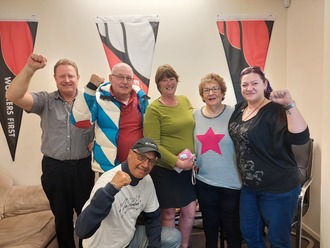
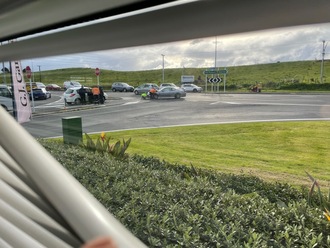

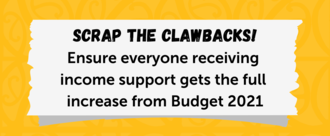
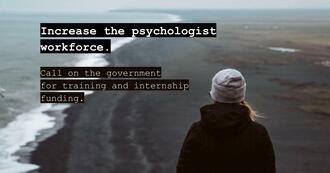.jpg)

